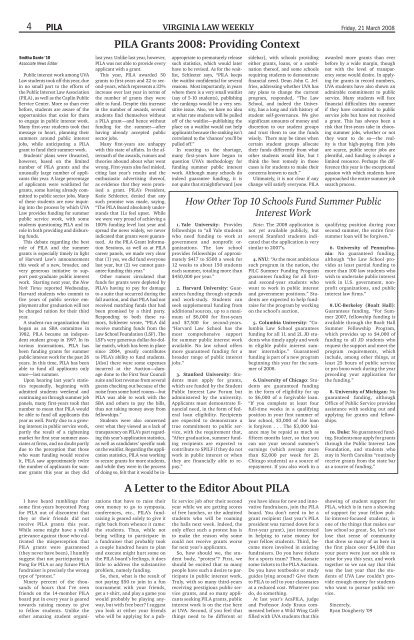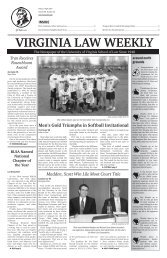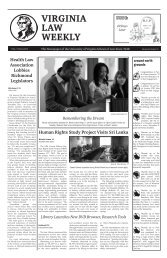Race Judicata - Virginia Law Weekly
Race Judicata - Virginia Law Weekly
Race Judicata - Virginia Law Weekly
Create successful ePaper yourself
Turn your PDF publications into a flip-book with our unique Google optimized e-Paper software.
4 PILAVIRGINIA LAW WEEKLYFriday, 21 March 2008Smitha Dante ’10Associate News EditorPublic interest work among UVA<strong>Law</strong> students took off this year, duein no small part to the efforts ofthe Public Interest <strong>Law</strong> Association(PILA), as well as the Caplin PublicService Center. More so than everbefore, students are aware of theopportunities that exist for themto engage in public interest work.Many first-year students took thatmessage to heart, planning theirsummers around public interestjobs, while anticipating a PILAgrant to fund their summer work.Students’ plans were thwarted,however, based on the limitednumber of PILA grants and theunusually large number of applicantsthis year. A large percentageof applicants were waitlisted forgrants, some having already committedto public sector jobs. Manyof these students are now inquiringinto the process by which UVA<strong>Law</strong> provides funding for summerpublic service work, with somestudents questioning PILA and itsrole in both providing and disbursingfunds.This debate regarding the bestrole of PILA and the summergrants is especially timely in lightof Harvard <strong>Law</strong>’s announcementthis week of a new, broader, andvery generous initiative to supportpost-graduate public interestwork. Starting next year, the NewYork Times reported Wednesday,Harvard students who commit tofive years of public service employmentafter graduation will notbe charged tuition for their thirdyear.A student-run organization thatbegan as an SBA committee in1982, PILA became an independentstudent group in 1997. In itsvarious incarnations, PILA hasbeen funding grants for summerpublic interest work for the past 26years. In this time, PILA has beenable to fund all applicants onlyonce—last summer.Upon hearing last year’s statisticsrepeatedly, beginning withadmitted students weekend andcontinuing on through summer jobpanels, many first-years took thatnumber to mean that PILA wouldbe able to fund all applicants thisyear as well. Partly due to a growinginterest in public service work,partly the result of a tighteningmarket for first year summer associatesat firms, and no doubt partlydue to the perception that thosewho want funding would receiveit, PILA saw approximately twicethe number of applicants for summergrants this year as they didPILA Grants 2008: Providing Contextlast year. Unlike last year, however,PILA was not able to provide everyapplicant with a grant.This year, PILA awarded 50grants to first-years and 22 to second-years,which represents a 33%increase over last year in terms ofthe number of grants they wereable to fund. Despite this increasein the number of awards, severalstudents find themselves withouta PILA grant—and hence withoutfunding for the summer—afterhaving already accepted publicsector jobs.Many first-years are unhappywith this state of affairs. In the aftermathof the awards, rumors andtheories abound about what wentwrong. First-years also feel misled,citing last year’s results and theenthusiastic advertising thereof,as evidence that they were promiseda grant. PILA’s President,Katie Schleeter, denied that anysuch promise was made, saying,“The PILA Board absolutely understandsthat 1Ls feel upset. Whilewe were very proud of achieving a100% funding level last year andspread the news widely, we neverindicated that grants were guaranteed.At the PILA Grant InformationSessions, as well as at PILAcareer panels, we made very clearthat (1) yes, we did fund everyonelast year, but (2) we cannot guaranteefunding this year.”Other rumors circulated thatfunds for grants were depleted byPILA’s having to pay for damageto a suite that occurred during thefall auction, and that PILA had notreceived matching funds that hadbeen promised by a third party.Responding to both these rumors,Schleeter wrote, “PILA didreceive matching funds from the<strong>Law</strong> School Foundation (LSF). TheLSF’s very generous dollar-for-dollarmatch, which has been in placesince 2004, greatly contributesto PILA’s ability to fund students.[Also] there were some expensesincurred at the Auction—damagedone to the First Year Councilsuite and lost revenue from severalguests checking out because of thenoise from some hotel rooms—butPILA was able to work with theSBA and others to pay the bills,thus not taking money away fromfellowships.”Students were also concernedover what they viewed as a lack oftransparency on PILA’s part regardingthis year’s application statistics,as well as candidates’ specific rankon the waitlist. Regarding the applicationstatistics, PILA was workingto secure grants for more students,and while they were in the processof doing so, felt that it would be in-appropriate to prematurely releasesuch statistics, which would laterhave to be revised. As for the waitlist,Schleeter says, “PILA keepsthe waitlist confidential for severalreasons. Most importantly, in yearswhere there is a very small waitlist(say of 5-10 students), publishingthe rankings would be a very sensitiveissue. Also, we have no ideaat what rate students will be pulledoff of the waitlist—publishing theplace on a waitlist would not helpapplicants because the ranking isn’tcorrelated to the ‘chances’ you’ll bepulled off.”In reacting to the shortage,many first-years have begun toquestion UVA’s methodology forfunding summer public interestwork. Although many schools doindeed guarantee funding, it isnot quite that straightforward [seeHow Other Top 10 Schools Fund Summer PublicInterest Work1. Yale University: Providesfellowships to “all Yale studentswho need funding to work atgovernment and nonprofit organizations.The law schoolprovides fellowships of approximately$417 to $500 a week for12 weeks to about 150 studentseach summer, totaling more than$450,000 per year.”2. Harvard University: Guaranteesfunding through stipendsand work-study. Students canseek supplemental funding fromadditional sources, up to a maximumof $6,000 for first-yearsand $7,500 for second-years.“Harvard <strong>Law</strong> School has themost comprehensive supportfor summer public interest workavailable. No law school offersmore guaranteed funding for abroader range of public interestjobs.”3. Stanford University: Studentsmust apply for grants,which are funded by the StudentPublic Interest <strong>Law</strong> Forum butadministered by the university.Applicants must demonstrate financialneed, in the form of federalloan eligibility. Recipientsare expected to demonstrate atrue commitment to public service,with the requirement that,“After graduation, summer fundingrecipients are expected tocontribute to SPILF if they do notwork in public interest or whenthey are financially able to repay.”I have heard rumblings thatsome first-years boycotted Pongfor PILA out of discontent thatthey or their friends did notreceive PILA grants this year.While some might have a validgrievance against those who cultivatedthe misperception thatPILA grants were guaranteed(they never have been), I humblysuggest that not participating inPong for PILA or any future PILAfundraiser is precisely the wrongtype of “protest.”Ninety percent of the thousandsof hours that I’ve seenfriends on the 14-member PILAboard put in every year is gearedtowards raising money to giveto fellow students. Unlike theother amazing student organizationsthat have to raise theirown money to go to symposia,conferences, etc., PILA’s fundraisingis geared solely to give itright back from whence it came:the students. Thus, while notbeing willing to participate ina fundraiser that probably tooka couple hundred hours to planand execute might hurt some onthe PILA board’s feelings, it doeslittle to address the substantiveproblem, namely funding.So, then, what is the result ofnot paying $50 to join in a funtournament with your friends,get a t-shirt, and play a game youwould probably be playing anyway,but with free beer? I suggestyou look at either your friendswho will be applying for a publicservice job after their secondyear while we are getting scoresof free lunches, or the admittedstudents who will be roamingthe halls next week. Indeed, theonly effect such a protest has isto make the reason why somecould not receive grants worsefor next year’s applicants.So, how should we, the studentbody, “protest”? First, weshould be excited that so manypeople have such a desire to participatein public interest work.Truly, with so many third-yearsreceiving prestigious public servicegrants, and so many applicantsseeking PILA grants, publicinterest work is on the rise hereat UVA. Second, if you feel thatthings need to be different orsidebar], with schools providingeither grants, loans, or a combinationthereof, and some schoolsrequiring students to demonstratefinancial need. Dean John C. Jeffries,addressing whether UVA hasany plans to change the currentprogram, responded, “The <strong>Law</strong>School, and indeed the University,has a long and rich history ofstudent self-governance. We givesignificant amounts of money anddiscretion to our student groupsand trust them to use the fundswisely. There may be times whencertain student groups allocatetheir funds differently from whatother students would like, but Ithink the best remedy in thosecases is for students to make theirconcerns known to each.”Ultimately, it is not clear if anychange will satisfy everyone. PILANote: The 2008 application isnot yet available publicly, butseveral Stanford students indicatedthat the application is verysimilar to 2007’s.4. NYU: “As the most ambitioussuch program in the nation, thePILC Summer Funding Programguarantees funding for all firstandsecond-year students whowant to work in public interestand government positions.” Studentsare expected to help fundraisefor the program by workingon the school’s auction.5. Columbia University: “Columbia<strong>Law</strong> School guaranteesfunding for all 1L and 2L JD studentswho timely apply and workin eligible public interest summerinternships.” Guaranteedfunding is part of a new programbeginning this year for the summerof 2008.6. University of Chicago: Studentsare guaranteed fundingin the form of eligibility for upto $6,000 of a forgivable loan.“If you complete at least fourfull-time weeks in a qualifyingposition in your first summer oflaw school, $3,000 of the loanis forgiven . . . The $3,000 balancemay be repaid as much asfifteen months later, so that youcan use your second summer’searnings (which average morethan $2,000 per week for 2LChicago students) as a source ofrepayment. If you also work in aA Letter to the Editor About PILAyou have ideas for new and innovativefundraisers, join the PILAboard. You don’t need to be agrant recipient (last year’s PILApresident was turned down for afirst-year grant), just interestedin helping to raise money foryour fellow students. Third, becomemore involved in existingfundraisers. Do you have ticketsfor a sports team? Then, donatesome tickets to the PILA Auction.Do you have textbooks or studyguides lying around? Give themto PILA to sell to your classmatesat a reduced cost. Whatever youdo, do something.At last year’s AcaPILA, judgeand Professor Jody Kraus commentedbefore a Wild Wing Caféfilled with UVA students that thisawarded more grants than everbefore by a wide margin, thoughnot with the level of transparencysome would desire. In applyingfor grants in record numbers,UVA students have also shown anadmirable commitment to publicservice. Many students will facefinancial difficulties this summerif they have committed to publicservice jobs but have not receiveda grant. This has always been arisk that first-years take in choosingsummer jobs, whether or notthey want to do so—the realityis that high-paying firm jobsare scarce, public sector jobs areplentiful, and funding is always alimited resource. Perhaps the differencethis year is the exceptionalpassion with which students haveapproached the entire summer jobsearch process.qualifying position during yoursecond summer, the entire firstsummerloan will be forgiven.”6. University of Pennsylvania:No guaranteed funding,although “the <strong>Law</strong> School providesat least partial funding tomore than 100 law students whowish to undertake public interestwork in U.S. government, nonprofitorganizations, and publicinterest law firms.”8. UC-Berkeley (Boalt Hall):Guarantees funding. “For Summer2007, fellowship funding isavailable through the Boalt HallSummer Fellowship Program,which provides up to $4,000 offunding to all JD students whorequest the support and meet theprogram requirements, whichinclude, among other things, atleast 25 hours of public serviceor pro bono work during the yearpreceding your application forthe funding.”8. University of Michigan: Noguaranteed funding, althoughOffice of Public Service providesassistance with seeking out andapplying for grants and fellowships.10. Duke: No guaranteed funding.Students may apply for grantsthrough the Public Interest <strong>Law</strong>Foundation, and students whostay in North Carolina “routinelyreceive grants from the state baras a source of funding.”showing of student support forPILA, which is in turn a showingof support for your fellow public-interest-focusedstudents, isone of the things that makes ourlaw school so great. So, let’s notlose that sense of communitythat drew so many of us here inthe first place over $4,100 thatyour peers were just not able toraise for you this year, and worktogether so we can say that thiswas the last year that the studentsof UVA <strong>Law</strong> couldn’t provideenough money for studentswho want to pursue public service.Sincerely,Ryan Dougherty ’09











